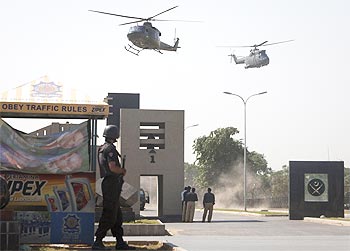
Heavily-armed Taliban terrorists dressed in military uniforms on Saturday targeted Pakistan army's headquarters in Rawalpindi near Islamabad, triggering a fierce gun battle that killed four attackers and six soldiers.
The terrorists armed with assault rifles and grenades came in a white van and opened fire when they were challenged by soldiers at a check post near a cricket stadium outside the fortified general headquarters of the army at 11.30 am local time.
After an intense exchange of fire with soldiers at the check post, the terrorists left the van and ran towards another checkpoint, firing indiscriminately at security personnel for almost 45 minutes, witnesses and officials said.
Witnesses said the attackers lobbed several grenades at the soldiers.
Chief military spokesman Maj Gen Athar Abbas said soldiers had foiled the attempt by terrorists to enter the general headquarters by gunning down four attackers.
"The situation is fully under control now and all four terrorists who were trying to enter (the compound) have been killed," he told media persons.
However, gunfire erupted again shortly after Abbas spoke to journalists. TV news channels reported that soldiers, including commandos of the elite Special Service Group, were conducting a search for two more terrorists who had apparently evaded the security forces. There was no official word on this development.
The brazen attack came as Interior Minister Rehman Malik declared that army would launch a major offensive in the militant stronghold of Waziristan in the next few days.
Outlawed Tehrik-e-Taliban Pakistan claimed responsibility for the attack, which came a day after the suicide bombing in the northwest city of Peshawar that killed over 50 people.
Geo News channel said it received a call from a man claiming to represent Amjad Farooqi faction of the Tehrik-e-Taliban Pakistan, who owned up responsibility for the attack.
The caller demanded that the government halt military operations against militants and make former president Pervez Musharraf accountable for his actions. He also said it should take steps to end purported activities in Pakistan of private security firm Blackwater and close down all Western non-governmental organisations.
Amjad Farooqi is a militant who rose to prominence after the 9/11 terror attacks in the US. He has been linked to the abduction and killing of Wall Street Journal reporter Daniel Pearl and attempts on Musharraf's life.
A resident of southern Punjab, Farooqi is believed to have close ties with banned Jaish-e-Mohammed and Lashkar-e-Jhangvi.
Dozens of commandos in black uniforms and wearing body armour cordoned off the general headquarters area, where traffic was stopped as several army helicopters hovered over the area to keep vigil.
Officials told reporters that at least six soldiers were killed in the exchange of fire. Abbas said there was "some confusion as the attackers were wearing camouflage uniforms."
Television images showed the white van of the militants with its doors open and packed with explosives abandoned near a check post gate.
The terrorists tried to gain entry to the military facility using a street that connects the Mall Road, one of Rawalpindi's main thoroughfares, to the general headquarters.
All roads leading to the army headquarters were sealed and only ambulances and vehicles of rescue services were allowed to enter the area. TV channels beamed deferred footage from the scene of the incident, as they believed aides of the terrorists could be monitoring the coverage.
Observers said the attack showed that Tehrik-e-Taliban Pakistan, whose chief Baitullah Mehsud was killed in a US drone attack in South Waziristan in August, still had the capability to strike at high-value targets despite the success of military operations against militants in the Swat valley.
The Taliban have vowed to target Pakistani security forces to avenge Mehsud's killing.
Interior Minister Malik said on Friday that a wave of suicide attacks and bombings had left the government with no option but to launch a military operation in South Waziristan, the main stronghold of the Taliban.
There was also a key similarity between Saturday's attack on the general headquarters and Monday's suicide bombing of the UN food agency's office in Islamabad -- in both the incidents, the attackers were disguised as security personnel. One of the terrorists killed in Saturday's attack was wearing the uniform of a Major.
Image: Military helicopters fly over the entrance to Pakistan's Army headquarters after the brazen attack.
Photograph: Reuters





